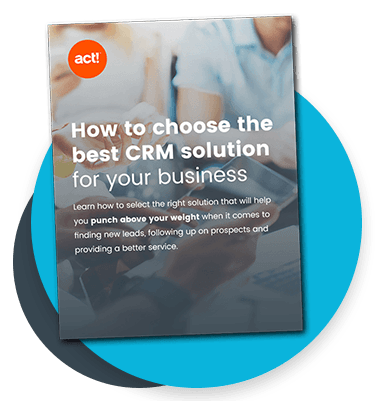As in nearly every other industry, customer experience has become a top priority for nearly 64 percent of manufacturing businesses.
And why wouldn’t it be?
After all, customers demand superior services and personalization from businesses. But implementing this, especially at scale, can be challenging.
That’s where manufacturing CRM (customer relationship management) software solutions come into the picture. But what are they all about? Why does your manufacturing business need them? And most importantly, how do you choose the right one for your organization? Let’s find out.
Why does your manufacturing business need a CRM?
Customers demand personalization. In fact, about 25 percent of customers want manufacturers to understand their needs better when they want a particular service. Similarly, 34 percent of customers want a better online customer experience and a smooth integration between multiple online and offline channels.
Achieving this requires you to better understand your prospects—their likes and dislikes, the stage of the buyer’s journey, and specific requirements. Sales reps must also be on the same page when they interact with these prospects. In addition, your manufacturing business needs to manage complex supply chains and product life cycles.
All these reasons call for you to have a single source of truth. You need a true manufacturing CRM software solution.
The manufacturing-specific challenges a CRM can solve
Let’s take a look at a few challenges a CRM can solve for manufacturing businesses.
Managing long, complex sales cycles
The manufacturing industry tends to have long sales processes and cycles that can go up to six months or more from lead generation to conversion. The duration could be even longer for custom products.
As a result, tracking every lead in your sales pipeline and keeping your messaging consistent throughout can be a challenge. A manufacturing CRM system helps you keep everyone on the same page and enables you to seamlessly move prospects toward conversion and beyond.
Keeping track of distributor/dealer relationships
CRMs can also help you streamline your relationships with dealers and distributors. Centralized communication means you can track conversations with all prospects with ease and reduce the risk of miscommunication. At the same time, features like Act! CRM’s project management tools can help you streamline your operations.
Gaining visibility into customer history across departments
A CRM for manufacturing serves as a single source of truth for all departments. With it, all teams can see your complete customer history.
From call notes to email conversations, everything is visible on the platform. This way, your teams can ensure that they deliver a consistent customer experience. It also paves the path for smarketing as sales and marketing teams stay in sync.
Wondering how to choose a CRM system that’s right for you? Download our free guide to learn all about CRM and how to choose the best CRM for your business.
Streamlining communication between sales, service, and operations
A manufacturing business thrives when sales, service, and operations work in tandem. And CRM solutions make information sharing between these teams a breeze.
With a CRM in place, you can easily launch cross-functional projects involving these teams. At the same time, automation and project management features let you track tasks and improve team efficiency. For instance, the sales team members will know production timelines well and can pitch to customers accordingly.
Tracking and nurturing leads from trade shows or industry expos
In 2024, a staggering 78 percent of organizers said that trade shows and events are a crucial component of their organization’s success. When you generate leads from these events, you need to start tracking and nurturing them right away.
The best CRMs for manufacturing can help you follow up with them through automated workflows. For instance, with Act! CRM, you can use email marketing automation to engage these high-value leads.
Linking sales forecasts to production planning
Inventory management is a key pillar of manufacturing, and CRMs can help with it. You can get sales forecasts from your CRM analytics data to understand how to go about production. It helps reduce the risk of stockouts or excess inventory, leading to better efficiency and profitability.
Key features to look for in a manufacturing CRM
So, how can you decide which manufacturing CRM platform is right for you?
While every CRM out there offers basic functions like contact and lead management, some advanced features can make the CRM an even better fit for your manufacturing business.
1. Marketing integration
Emails play an important role in following up and engaging with leads and customers. If your CRM offers built-in marketing features or allows integrations with marketing tools, this process can become a breeze.
For example, Act! comes with a marketing automation suite. You can launch automated email marketing campaigns to engage leads from within the platform. It also offers event and SMS marketing features to help you generate more leads and nurture them across multiple channels.
2. Mobile access
Your sales reps often have to hit the road to meet clients or leads as they build working relationships. In those moments, it helps to have mobile access to your CRM. With a mobile CRM like Act!, your sales reps can stay informed about any customer updates on the go and also inform your team about any new developments. It helps them close deals with ease.
3. Industry-specific features
Your CRM should also offer manufacturing-specific features. For instance, it could offer integrations with manufacturing software like an ERP (Enterprise Resource Planning) or MES (Manufacturing Execution System).
Act!, for example, provides custom industry tables with pre-built industry-specific templates. You can track product warranties, contracts, and service plans and get alerts. At the same time, all your customer data will be in one spot instead of spread across different spreadsheets.
Use cases and real-life scenarios
Let’s now see how a CRM has helped a few manufacturing companies streamline their operations.
1. DuChâteau
DuChâteau uses Act! CRM to manage over 3,000 contacts. The integration of email, scheduling, and phone calling features has allowed DuChâteau to personalize its interactions with customers at scale. It has also ensured seamless follow-ups and boosted operational efficiency.
As Joe English, Territory Manager forDuChâteau, says, “The ability to sync emails, phone calls, and other communications all in one place has transformed how I operate and lets me focus on what really matters—growing our business!”
2. Cameron Instruments Inc.
This manufacturing business is able to email up to 5,000 customers using Act!’s marketing automation features. It also enables the company to manage its vast customer base with a lean team.
Sonja Bosshard, Cameron Instruments’ Sales and Marketing Manager, says, “With Act! Marketing Automation, we can reach a larger number of potential customers and prospects and monitor their responses more effectively.”
Give your manufacturing business the Act! edge
Running a manufacturing business can be very demanding, especially as a small business owner. There are numerous moving parts and stakeholders you need to take care of.
But with the right CRM for manufacturing, you can delight customers, elevate your marketing, and drive more sales.
With Act! CRM (soon to turn into a full-office business suite), you get several advanced features like superior customer support, web forms, interactive quotes, accounting link, and even customer portals. Experience our 14-day free trial to see how it can help your manufacturing SMB.
FAQs
A CRM empowers manufacturing companies by enabling them to manage customer and prospect interactions better. They centralize all customer information and come with dashboards that help you keep up with all customer interactions. It also helps streamline other business processes like inventory management and order tracking.
Act! CRM is the best solution that can help manufacturing businesses delight customers. With its superior customer support, web forms, marketing automation, and customer portals, you can improve customer satisfaction and boost revenues. Your sales reps can also use its mobile app to update and access information on the go in real time.
To choose the best CRM for manufacturing, look for these features:
- Marketing tools
- Mobile access
- Manufacturing-specific features
- Third-party integrations
- Customer support
Some of the benefits of manufacturing CRMs include:
- Better pipeline management
- Improved inventory management
- Elevated customer satisfaction levels
- Better synergy between sales and marketing
- Easier tracking of dealer/distributor relationships
- Linking of sales forecasts to production planning






